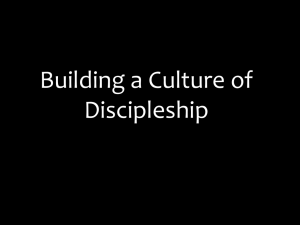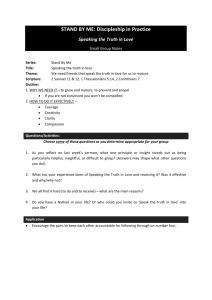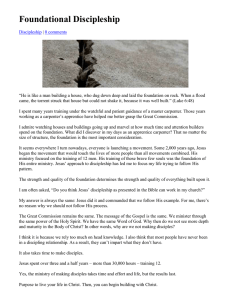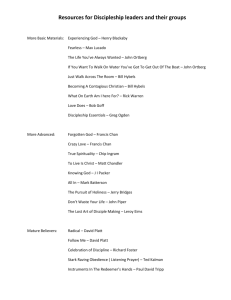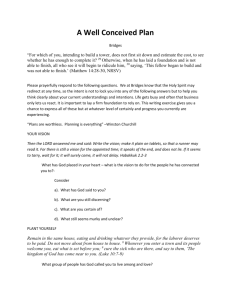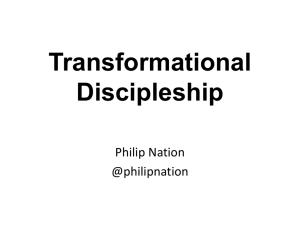Note: Course content may be changed, term to term, without
advertisement
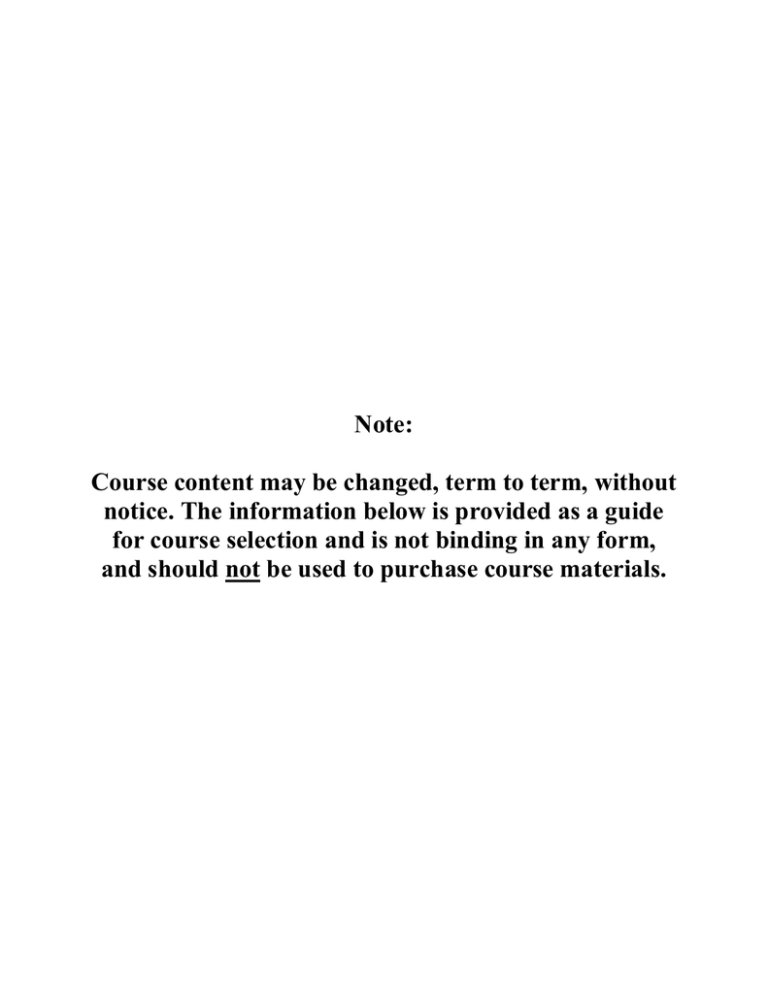
Note: Course content may be changed, term to term, without notice. The information below is provided as a guide for course selection and is not binding in any form, and should not be used to purchase course materials. DSMN 610 Course Syllabus COURSE SYLLABUS DSMN 610 FAMILY DISCIPLESHIP COURSE DESCRIPTION This course studies the idea and practice called “family discipleship.” It presents a framework in which a family leader can disciple household members beyond spiritual comprehension to a personal appropriation of the apologetic and application of Scripture. Attention will be given to the family leader’s responsibilities toward spiritual leadership and biblical discipleship, specifically to responsibilities regarding the Gospel, basic doctrine, systematic theology, the Great Commission, spiritual disciplines, practical Christian living, and worldview/philosophy. Various techniques for family discipleship will be examined, including family devotions, drill and catechism, Scripture memory, storytelling, teaching moments, relational example and intentional rehearsal. RATIONALE The purpose of this course is two-fold. The first is that it will equip students who are or will be facing the responsibility of leading his/her family through biblical discipleship. The second purpose is to effectively teach ministry leaders to equip others in the discipleship of their own families via church ministry, both in modeling and strategic planning. Discipleship in the family is a vital qualification of a New Testament pastor (1 Timothy 3:4; Titus 1:6). Families who reflect the fruit that comes from biblical discipleship will be witnesses in our world of the goodness, hope, reconciliation, and redemption offered to all through a submission to Christ. I. II. PREREQUISITES For information regarding prerequisites for this course, please refer to the Academic Course Catalog. REQUIRED RESOURCE PURCHASES Click on the following link to view the required resource(s) for the term in which you are registered: http://bookstore.mbsdirect.net/liberty.htm III. IV. ADDITIONAL MATERIALS FOR LEARNING A. Computer with basic audio/video output equipment B. Internet access (broadband recommended) C. Microsoft Word (Microsoft Office is available at a special discount to Liberty University students.) MEASURABLE LEARNING OUTCOMES Upon successful completion of this course, the student will be able to: Page 1 of 4 DSMN 610 Course Syllabus V. A. Evaluate biblical approaches and methodologies to family discipleship. B. Synthesize current literature on family discipleship with the practical application of family discipleship. C. Analyze the strengths and weaknesses of the family discipleship that took place among biblical characters. D. Explain solutions that can address various challenges commonly found in a family discipleship strategy. E. Identify specific objectives that should be included in a holistic family discipleship plan. F. Create a family discipleship plan that incorporates specific activities and exercises that facilitate training a child in the way they should go. COURSE REQUIREMENTS AND ASSIGNMENTS A. Textbook readings and lecture presentations/notes B. Course Requirements Checklist After reading the Syllabus and Student Expectations, the student will complete the related checklist found in Module/Week 1. C. Discussion Board Forums (4) The student is required to create a thread in response to the provided prompt for each forum. Each thread must be 300 words and demonstrate course-related knowledge. In addition to the thread, the student is required to reply to 2 other classmates’ threads. Each reply must be 150 words. (Outcomes: A, B, C, D, E, F, I) D. Church Discipleship Assessment The student will complete a 4–5-page essay explaining how his/her current church approaches family discipleship and evaluating its perceived success. The Church Discipleship Assessment must include formal and informal strategies, parental involvement, training, outcomes, and communication/promotion. In the absence of any strategic efforts in his/her church setting, the student must evaluate the consequences that the lack of a plan has within his/her local church setting. A minimum of 3 course textbooks/materials or outside sources must be cited in current Turabian format. (Outcomes: I, J, K, L) E. Family Discipleship Objectives Essay The student will complete a 3–5-page essay on objectives and outcomes of family discipleship that answers the following questions: (1) How do parents plan for family discipleship to occur? (2) What are general areas which should be addressed through a family discipleship strategy? (3) What aspects of family discipleship are out of the control of the parent? (4) How do we prepare our children for life challenges and temptations? At least 3 course textbooks/materials Page 2 of 4 DSMN 610 Course Syllabus or peer-reviewed sources must be cited in current Turabian format. (Outcomes: I, J, K, L) F. 4MAT Book Review The student will critique the Tripp and Tripp textbook, Instructing a Child’s Heart, using the 4MAT Book Review system. The book review must: be 4–6 pages and must be submitted as a Microsoft Word document.The paper must follow current Turabian format. (Outcomes: B, C, E, F, G, H, J) G. Research Paper 1. Topic and Thesis Statement The student will write and submit his/her topic and thesis statement for the final paper. This portion of the assignment must clearly communicate to the instructor where the student is directing his/her paper. 2. Annotated Bibliography The student will submit an annotated bibliography for his/her paper. The bibliography must contain 10 sources pertinent to the topic being studied with a brief annotation/synopsis of each source. The sources must be current and cited in current Turabian format. 3. Final Submission The student will write a 10–15-page research-based paper in current Turabian format. The paper must include at least 10 references in addition to the course textbooks and the Bible. (Outcomes: J, K, L) H. Exam The exam will cover the Reading & Study materials for Modules/Weeks 1–6. The exam will be open-book/open-notes, contain 30 multiple-choice and 20 true/false questions, and have a 1-hour and 30-minute time limit. (Outcome: C) VI. COURSE GRADING AND POLICIES A. Points Course Requirements Checklist Discussion Board Forums (4 at 100 pts ea) Church Discipleship Assessment Family Discipleship Objectives Essay 4MAT Book Review Research Paper Topic and Thesis Statement Annotated Bibliography Final Submission Exam (Modules 1–6) 10 400 100 100 100 Total 10 40 150 100 1010 Page 3 of 4 DSMN 610 Course Syllabus B. Scale A = 940–1010 A- = 920–939 B+ = 900–919 B = 860–899 B- = 840–859 C+ = 820–839 C = 780–819 C- = 760–779 D+ = 740–759 D = 700–739 D- = 680–699 F = 0–679 C. Late Assignment Policy If the student is unable to complete an assignment on time, then he or she must contact the instructor immediately by email. Assignments that are submitted after the due date without prior approval from the instructor will receive the following deductions: 1. Late assignments submitted within one week of the due date will receive a 10% deduction. 2. Assignments submitted more than one week late will receive a 20% deduction. 3. Assignments submitted two weeks late or after the final date of the class will not be accepted. 4. Late Discussion Board threads or replies will not be accepted. Special circumstances (e.g. death in the family, personal health issues) will be reviewed by the instructor on a case-by-case basis. D. Style Guidelines All assignments for this course are to be formatted in accordance with the LBTS Writing Guide and the latest edition of the Turabian style manual (A Manual for Writers of Research Papers, Theses, and Dissertations). Discussion assignments and essay examinations may use the parenthetical citation style. All other written assignments should use the footnote citation style. Supplemental writing aids are available via the Online Writing Center. E. Extra Credit No additional “for credit” assignments will be permitted beyond those given in the course requirements stated above. F. Course Changes Course requirements are subject to change by the administration of the University at any time with appropriate notice. G. Disability Assistance Students with a documented disability may contact Liberty University Online’s Office of Disability Academic Support (ODAS) at LUOODAS@liberty.edu to make arrangements for academic accommodations. Further information can be found at www.liberty.edu/disabilitysupport. Page 4 of 4 COUR ### Course Schedule COURSE SCHEDULE DSMN 610 Textbooks: Renfro et al., Perspectives on Family Ministry (2009). Thompson, Intentional Parenting (2011). Tripp & Tripp, Instructing a Child’s Heart. (2008). Tripp, Shepherding a Child’s Heart. (1995). Wray & Wray, Charting a Course for Your Family’s Future (2013). Wright & Graves, ApParent Privilege. (2008). MODULE/ WEEK READING & STUDY 1 Renfro et al.: chs. 1–5 Wright & Graves: chs. 1–5 1 presentation Course Requirements Checklist Class Introductions DB Forum 1 10 0 100 2 Renfro et al.: chs. 6–10 Wright & Graves: chs. 6–9 1 presentation Church Discipleship Assessment 100 Tripp: chs. 1–12 1 presentation DB Forum 2 Research Paper – Topic and Thesis Statement 100 3 4 Thompson: chs. 1–6 Tripp & Tripp: chs. 1–5 Tripp: chs. 13–19 1 presentation DB Forum 3 100 Family Discipleship Objectives Essay Research Paper – Annotated Bibliography 100 5 Tripp & Tripp: chs. 6–10 2 presentations 1 lecture note 6 Wray & Wray: chs. 1–4 4 presentations 4MAT Book Review Exam 100 100 7 Wray & Wray: chs. 5–8 1 presentation Research Paper – Final Submission 150 8 Wray & Wray: chs. 9–11 1 presentation DB Forum 4 100 TOTAL 1010 ASSIGNMENTS POINTS 10 40 DB = Discussion Board NOTE: Each course week begins on Monday morning at 12:00 a.m. (ET) and ends on Sunday night at 11:59 p.m. (ET). The final week ends at 11:59 p.m. (ET) on Friday.
